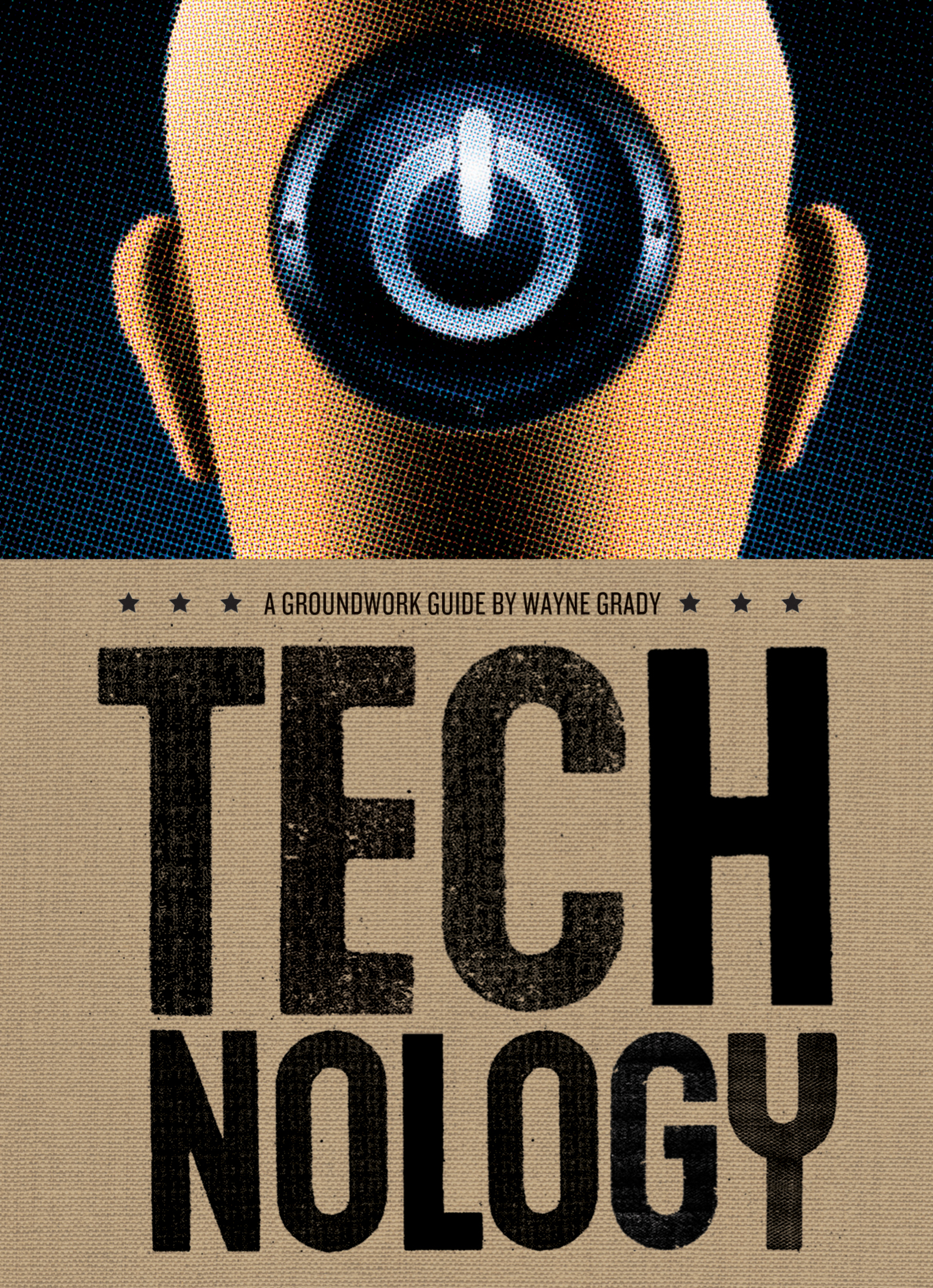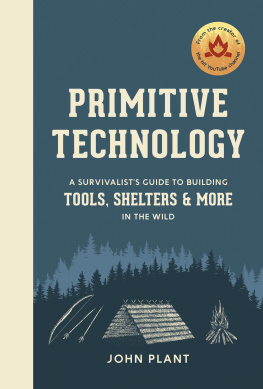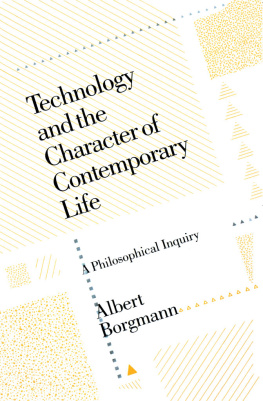
Slavery Today
Kevin Bales & Becky Cornell
The Betrayal of Africa
Gerald Caplan
Sex for Guys
Manne Forssberg
Technology
Wayne Grady
Hip Hop World
Dalton Higgins
Democracy
James Laxer
Empire
James Laxer
Oil
James Laxer
Cities
John Lorinc
Pornography
Debbie Nathan
Being Muslim
Haroon Siddiqui
Genocide
Jane Springer
The News
Peter Steven
Gangs
Richard Swift
Climate Change
Shelley Tanaka
The Force of Law
Mariana Valverde
Series Editor
Jane Springer
Technology Wayne Grady | Groundwood Books House of Anansi Press | Toronto Berkeley |
Copyright 2010 by Wayne Grady
Published in Canada and the USA in 2010 by Groundwood Books
All rights reserved. No part of this publication may be reproduced, stored in a retrieval system or transmitted, in any form or by any means, without the prior written consent of the publisher or a license from The Canadian Copyright Licensing Agency (Access Copyright). For an Access Copyright license, visit www.accesscopyright.ca or call toll free to 1-800-893-5777.
Groundwood Books / House of Anansi Press
128 Sterling Road, Lower Level, Toronto, Ontario M6R 2B7
or c/o Publishers Group West
1700 Fourth Street, Berkeley, CA 94710
We acknowledge for their nancial support of our publishing
program the Canada Council for the Arts, the Government of Canada through
the Canada Book Fund (CBF) and the Ontario Arts Council.
Library and Archives Canada Cataloguing in Publication
Grady, Wayne
Technology / Wayne Grady.
(Groundwork guides)
ISBN 978-0-88899-982-5 (bound).ISBN 978-0-88899-984-9 (pbk.)
1. TechnologyHistory. 2. Technology and civilization. 3. TechnologySocial aspects. I. Title. II. Series: Groundwork guides
CB478.G73 2010 303.483 C2010-902463-X
Design by Michael Solomon
Index by Gillian Watts
Contents
For Merilyn.
Chapter 1
Technology and Us
I remember when Hurricane Katrina struck the southeast coast of the United States in September 2005. The high winds and flooding killed more than 1,800 people and caused such enormous damage that the city of New Orleans is still recovering from it. Powerful waves also destroyed thirty oil-drilling rigs in the Gulf of Mexico, and disrupted the flow of oil from offshore wells to refineries on the mainland. The resulting oil shortage exacerbated the public unease caused by the storm. In response, then president George W. Bush appeared on television and urged everyone to use less oil until the pipelines could be repaired.
Dont worry, the president told the people. Technology will find a solution.
Two things about Bushs statement struck me as odd. One was the way he referred to technology as an entity somehow separate from human endeavor. He did not say that human beings technicians, engineers or oil company executives would get the US out of its predicament. Something called technology would.
The second, related to the first, was the implication that, having turned technology into an independent entity, we were relying on it to get us out of trouble. We have handed responsibility for our salvation over to this thing called technology. In other words, we were not in control of the rescue operation, technology was.
When critics of technology argue that human beings have become slaves of the machine, they mean that we have assigned to this process called technology the power to dictate and control our actions. Like worker ants in a gigantic ant colony, we unthinkingly carry out functions assigned to us by a distant and abstract authority.
It hasnt always been that way. In fact, technology began as a means of bending nature to our will. At the close of the Pleistocene Era, roughly 10,000 years ago, when the end of the last Ice Age permitted the rapid growth of agriculture, humans developed a primitive form of farming that did not require tools. It wasnt until about 3,000 years later that implements such as axes and plows were developed as means of making it easier to work the land. At that time, we still controlled technology, which in turn allowed us to control our environment.
At some point in our history, however, we relinquished control of technology. By becoming reliant upon machines and the systems that support them for our survival, we became more attuned to their needs than to our own. In fact, their needs became our needs. For example, as human beings, we dont need oil: machines need oil. But since we believe that we need machines, we have come to believe that we need oil.
When did this change in our relationship with technology occur? And why? What are the consequences for our relationship with ourselves, our environment and our future? Before we can address any of these questions, we need to have a clear understanding of what technology is.
Lets start with what it is not. First, it is not simple tool use. Many animals use tools. For example, woodpecker finches on the Galapagos Islands use cactus spines and even wood chips to pry insect larvae from the bark of trees. Dolphins off the coast of western Australia have been observed protecting their faces with marine sponges while probing the sea floor for stonefish, whose sharp spines can deliver a severe shock. Great apes in the Congo use stones to crack nuts, and Egyptian vultures in Tanzania use stones to open hard-shelled ostrich eggs.
And although Homo sapiens (the Wise) has been referred to as Homo faber (the Maker), technology is more than the ability to manufacture tools. New Caledonian crows routinely clip, peel, strip and split screw-pine leaves to make hooked tools for extracting insect grubs from the ground. And in an experiment conducted at Oxford University, a female New Caledonian crow actually bent a length of wire into a hook and used it to lift a small bucket of food from a vertical standpipe.
Technology is more a process than a thing. It is, as economist C.E. Ayres wrote in 1944, simply organized skill. It is the word organized that is important here. Neanderthals ( Homo sapiens neanderthalensis ), our ancestors in the evolutionary chain that runs from tool-using apes to us, lived from 250,000 years ago to about 24,000 years ago. They used simple stone tools, known as flakes, for butchering meat and scraping skins. They also used spears, although for thrusting, not throwing. These tools show up in the most recent Neanderthal archaeological sites, suggesting they may have learned tool use from our more direct ancestors, the technically sophisticated Cro-Magnons, who migrated into Europe from Africa around that time.
Cro-Magnons were more organized than Neanderthals. They, too, used stone tools for cutting and scraping, but their stone blades were attached to handles in what can be seen as a rudimentary manufacturing process. They also made implements from a wider variety of materials, including bone, antler and ivory. They used tools for piercing and chiseling as well as for pounding and cutting, and they threw their spears, which meant they could kill their prey from a safe distance. Graeme Gibson suggests that this was the beginning of our separation from nature. Organized tool use was certainly the start of our idea that nature was something we could control.
Next page
















